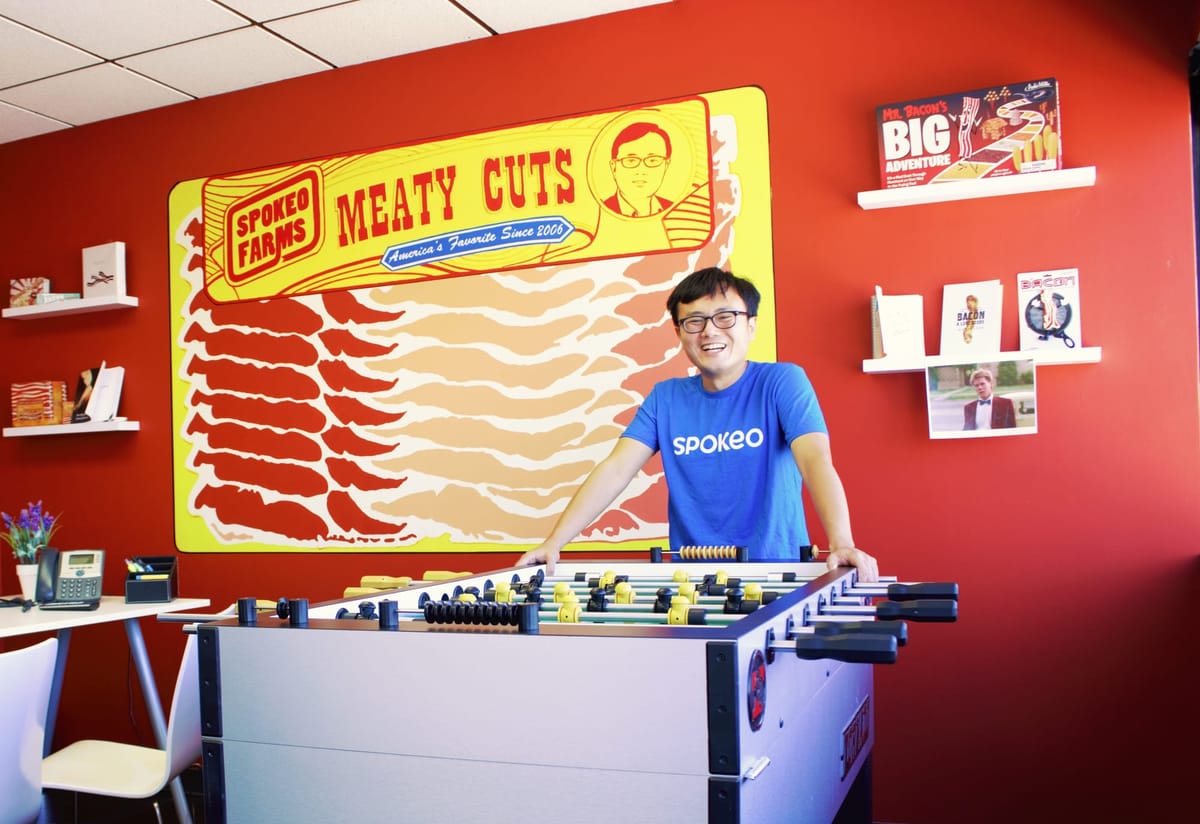Harrison Tang made a $100m Company from his Basement (Spokeo)

Four college students started out building a social media aggregator, then turned it into a multi-million dollar search engine business. Find out how they did it below.
Look up Harrison Tang and Spokeo on the web and you’d think he was Attila and they the Hun army, wrecking the lives of everyone in their path.
Bloggers spew vitriol about this information tech firm while larger publications have previously described the CEO and his staff as secretive and in hiding. Information about lawsuits and privacy complaints litter half their Wikipedia page.
So when I was granted a meeting with Harrison to check out his offices in Pasadena, CA, I expected to see a group of protesters laying siege to an underground bunker guarded by special ops mercenaries.
But there was none of that.
Instead, inside their seventh floor space, all I saw were patches of young hard-working millennials in a fun looking lair, filled with high top desks surrounded by more computer screens than I’ve come across at all the electronic retail chains combined.
Also, Harrison’s desk was right next to the front door, closest to the entrance. Not the usual back corner office with floor to ceiling windows preferred by most CEO’s.

So are they the Big Bad Wolf? Yeah, but not in the way they’ve been portrayed by online detractors.
It’s because Spokeo is on its way to being the top dog in its industry after overcoming a number of obstacles.
Harrison gives us the lowdown on how Spokeo’s grown from four college roommates to 190 employees and has its goals set to becoming a $100 million business.
How Spokeo Started
While attending Stanford University, Harrison wanted to start a company that compiled social media to users in a more simplified, accessible way.
Figuring that he had to partner up with the people he knew best, he coerced both his undergrad and graduate school roommates to join him in the startup.
The guys that teamed up with him were Mike Daly, Ray Chen and Eric Liang. The starting four. All of them were engineers who could build the technology.
That was 2006.

Where was their first office?
Saratoga, California.
In Harrison’s parent’s basement where computer servers were stuffed into the bathroom to drown out the noise. There was no Amazon Cloud back then.
Without any employees, they each performed multiple tasks and did everything necessary to keep the business going. That’s what entrepreneurs do.
“I’m a product-focused person. My main responsibility was to define the product. I also drew wireframes and worked with the designer to come up with the user interface.
But when we were a startup, I was the only customer service department rep. We had to be scrappy.”
Finding Cash To Start
Entrepreneurs always need money when building a business. Time and time again, we learn that the majority of them get their first investments through family and friends.
“No one wanted to give us funding in the beginning because we had no track record of success.”
Harrison’s dad, uncle and another one of the founding member’s parent generously donated some cash to get the guys started. In the low six figure range.
But the house party didn’t last long.
“When we got stuck building new stuff, all we would do in the house was play video games like Warcraft and Dota.
My dad lit a fire up our ass and forced us to rent a one room office for $550 a month, to separate the work and personal life.”
Lesson here is stop wasting time on video games or your parents will kick you out of the house.
That’s unless you’re in the game industry kids!
He relays the best advice his dad gave him when moving out.
“Just do everything you can do to survive. Success is not about IQ and how smart you are, but how much longer you can outlast your competition.”
The First Few Business Models Didn’t Pan Out
Originally, the business model was analyzing and aggregating social media, a product which they gave out free to users. It generated little income but gained them a large loyal customer base, which was extremely important down the line.
Free products gain you future customers.
Without a substantial click-through and engagement rate via online ads, they couldn’t continue with the same formula.
“We had a lot of users but they didn’t want to click on the ads that we had on the site. You don’t want to buy unprofitable ads as it will kill your business.”
So they repackaged the technology from a social media aggregator to a social search engine.
Why? Because they had to.
“Running out of funding is stressful. But none of us wanted to give up.”
Customer Service Tracking Board
Realizing that customers were willing to spend to use a social search engine, they replaced the free model for a pay service. Four to five months later, Spokeo turned cash flow positive.
Businesses usually follow the money and there are many examples in history where companies have ditched their original plans to chase after more lucrative strategies.
After moving their offices to Pasadena in 2009, Spokeo changed their business model once again and followed the money to “people” searches.
He states that 8% of total online searches are first and last names of individuals.
“It’s the second biggest vertical behind location searches.”
Before 2009 and the second change in strategy, they had less than 10 employees. Since then, they’ve grown almost 20 fold.
A smart play call on their end.
So How Did They Increase Traffic?
For online businesses, there are a few options, depending on your industry.
Since their product isn’t visual, social media wasn’t going to generate them any acquisitions.
“We use social media as a customer engagement channel, not for customer acquisition. Social media is not yet a significant part of our marketing efforts.”
For Spokeo, Harrison tells us they rely strictly on three categories to acquire customers that fit the product, in this case, information.
1. Direct Traffic – The most difficult to attain, you need to build a strong brand and product.
“The general rule of thumb is to figure out ONE unique problem that your product solves for your users. For example, Spokeo’s value proposition is to help our users research and reconnect with others.”
2. SEO – When people search for names, or names in a city on popular search engines, Spokeo results often show up on the first page because they offer unique results that cannot be easily found elsewhere.
3. Paid Marketing – Includes a number of tactics from (1) search marketing, (2) display marketing, (3) social marketing, (4) affiliate marketing, (5) content marketing, and (6) partnerships with major publishers. Since a startup can’t financially utilize all of them, it’s best to focus on one or two. Spokeo started its paid marketing campaigns with Google Adwords search marketing.
He explains further:
“We have a balanced revenue split among direct, SEO, and paid marketing. Every channel has its own pros/cons. For example, paid marketing might be easy to scale, but margins are a lot lower than direct and SEO. It’s important to keep a balanced customer acquisition strategy for business sustainability.
Obviously, there is no one right answer he says. You have to know your product, your users and “adjust accordingly.”
Defeating Your Competitors
According to EbizMBA, there are at least 15 “people” search engines that draw in anywhere from 1 million to 28 million unique visitors to their websites per month.
That’s a lot of people looking for info on other people, people!
Spokeo’s #2 on that list and Harrison explains what separates his company from the rest.
It all comes down to “data quality,” which he breaks down into four segments.
1. Better coverage with over 12 billion records.
2. Depth of each individual profile and the information you can extract.
3. Accuracy of the information.
4. Freshness of information.
How Much Money Is Spokeo Generating?
The numbers don’t lie.
Spokeo has 18 million unique visits to their site every month and their customers range from businesses and law enforcement using the information to “mitigate crime and fraud” to individuals who are looking to connect and re-connect with others.
Last year, they reported revenue to be $57 million, about a 40% change from the prior year. Since Harrison told us he expected similar growth by the end of this year, we can guesstimate their revenue to be in the $70 million to $80 million range.
How do they get to these figures?
They just need 2% to 3% of those 18 million unique visitors per month to sign up for the lowest rate offer of $13.95 for one month.
All this for accumulating and scraping together personal information on individuals that’s floating in cyberspace.
Luring Talent To The Company
They’ve got living room style work areas, kitchens loaded with food and drinks, and shelves full of snacks located next to their personal desk space.
Also included are catered breakfasts, lunches and sometimes dinners. Because they can afford it.
Can’t imagine turning down their offer if you’re coming straight out of college.
“We also pay for sports games and gym memberships. And we want our employees to focus on a work life balance.”
Besides the perks, he told us that most of his employees know and appreciate the fact that their jobs affect millions of customers.
But running a company that’s growing at a rapid rate also comes with its pressures.
“Today, there are a lot of challenges like communication with 190 different employees. It’s hard to remember everyone’s names and their job duties. It’s impossible to know what everyone is doing and harder to rally everyone into a particular direction.”
How Spokeo Deals with Controversy and Complaints
Spokeo didn’t start out looking to sell people’s private information. They wanted to gather social media sites to help them. But ultimately, it’s a business and they found a market with a huge demand for information.
And they had the technology to provide it.
Harrison told us that they are doing whatever it takes to make sure that their customers are using the information for the right reasons.
“People have different feelings on privacy. For us, it starts with acknowledgement. We responded with easy opt out steps and we have a process of vetting our users. If it doesn’t meet our criteria, they cannot use the site. So the site is used for the right purpose.”
Obviously, it’s a nearly impossible task to decipher whether or not someone wants to use the information on the site for the right reasons. But at least they are making an effort to address the problems that have been lobbied against them in regards to privacy.
“Have courage to listen and acknowledge. Don’t dodge it. Then dissect problem one by one. How you deal with it that matters the most.”
After all the hard work, the successes and challenges they’ve faced, Harrison tells us what’s most important to him and his tips on success and survival.
“I can honestly say that I have tried my best.
You have to try to survive, have persistence, and outlast the competition because there are a lot of hurdles. More than 90% of startups fail so you have to find the right teammates, the funding and have accountability for yourself, your family and teammates.
Challenges never end, so enjoy the process.”
We asked if his parents were ever paid back their original loan.
“None of us have taken money out of the company. My parents are retired, and we still haven’t paid them back. All they really care about is my health and if I’m spending time with my son.”
I think they’re waiting for him to hit the $100 million mark before they ask for the original principle back with interest.
Website: Spokeo
Twitter: @spokeo




